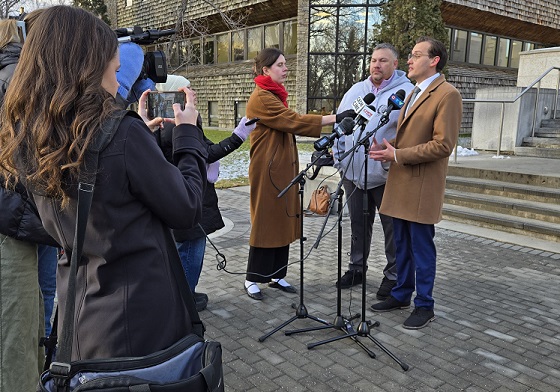Great Reset
RCMP veterans’ group promotes euthanasia presentation to members

From LifeSiteNews
The Nova Scotia RCMP Veterans Association encouraged members, many of whom suffer from PTSD, to attend a presentation by a euthanasia practitioner, and one veteran with cancer was personally invited.
A Nova Scotia police veterans’ group has been exposed for advertising euthanasia to its members.
In a November 20 email leaked to CAF veteran Kelsi Sheren, the Nova Scotia branch of the RCMP Veterans Association encouraged veterans to attend a presentation on so-called “medical assistance in dying” (MAID), in the latest move to push death on Canadian veterans.
“I served for 32 years on the West Coast and retired in 2019,” the RCMP member who leaked the email wrote. “As a Christian and a retired member of the RCMP I wanted to share this with you. I’m trying to wrap my head around this shocking email. I’m shocked it’s come to this.”
The event will take place on November 22 at St. John the Evangelist Anglican Parish. The presentation will be given by Dr. Gordan Gubitz, who is known for as a euthanasia practitioner and the Clinical Lead for MAID in Nova Scotia. Sheren condemned the event as “coercion,” warning that “this is a state-aligned institution… normalizing death as a service to the very people they already failed to support in life. This was a information session, to ‘educate’ veterans [whose] rates of PTSD and suicidality were already sky high. How they can apply or use MAID.”
In an interview with LifeSiteNews, a military chaplain wishing to remain anonymous warned that “This is clearly the culture of death spreading its tentacles, and is a huge insult to veterans.”
“As a military chaplain, it’s ironic how not long ago [we] focused on suicide prevention… this attested to the value of human life,” he continued. “While, at the moment, efforts are clearly being focused on suicide facilitation.”
“I know for myself and several of my chaplain colleagues, we are already making plans to exit the military,” the chaplain disclosed. “This is not what we signed up for. This is not the country we swore to defend.”
After the leaked email went viral on social media, a RCMP veteran suffering from cancer revealed that he was personally invited to the event, in what appeared to be a coercive tactic to force him to choose suicide.
People
This is bad…: so much worse than anyone thought.
The enemy is in the gate.
I need your help. pic.twitter.com/POhXMkQ8N9
— Kelsi Sheren (@KelsiBurns) November 21, 2025
“Not only did I [receive] that email, I received a phone call asking if I was going to attend,” he told Sheren. “Based on the severity of my illness I believe I was directly targeted.”
The veteran further revealed that the presentation is not exclusive to Nova Scotia but is part of a country-wide initiative to promote euthanasia to veterans.
“As part of the new budget it appears that the government may be looking to move the RCMP away from veterans affairs to another government run entity that will manage RCMP disability benefits and healthcare for our veterans,” the veteran explained. “There is significant concern in our organization as to what this is going to mean for our vets. The fact that they are now pushing MAID to our vets, most of [whom] suffer from PTSD, is of grave concern.”
As LifeSiteNews previously reported, earlier this month, Sheren told the House of Commons that no less than 20 of her colleagues were offered unsolicited state-sponsored euthanasia.
As reported by LifeSiteNews, it was revealed last year that the federal department in charge of helping Canadian veterans appears to have purposefully prevented the existence of a paper after scandalous reports surfaced alleging that caseworkers had recommended euthanasia to suffering service members.
LifeSiteNews recently published a report noting how a Canadian combat veteran and artillery gunner revealed, while speaking on a podcast with Dr. Jordan Peterson, that the drugs used in MAID essentially waterboard a person to death. Assisted suicide was legalized by the Liberal government of former Prime Minister Justin Trudeau in 2016.
A new Euthanasia Prevention Coalition report has revealed that Canada has euthanized 90,000 people since 2016.
MAiD
Health Canada suggests MAiD expansion by pre-approving ‘advance requests’

From LifeSiteNews
Health Canada released reports discussing advance requests for euthanasia, which would allow Canadians to pre-authorize their own killing even after losing decision-making capacity.
Health Canada has released a series of studies on advance requests for assisted suicide in its latest move to expand the nation’s euthanasia regime.
On October 29, Health Canada published a summary of the National Conversation on Advance Requests for Medical Assistance in Dying, which focussed on the suggestion to expand Medical Assistance in Dying (MAiD) by allowing advance requests for death by lethal injection.
“An advance request is a request for MAiD made by an individual who still has the capacity to make decisions, but before they are eligible or want to receive it,” the report stated. “Their intent is that MAiD be provided in the future: after they have lost the capacity to consent and when they meet the eligibility criteria for receiving MAiD.”
As it stands, in order for a person to be killed by euthanasia in Canada, they must provide “consent” at the time of their suicide. So-called “advance requests” would allow a person to approve their killing at a future date, meaning it would be carried out even if they are incapable of consenting, due to diminished mental capacity or other factors, when the pre-approved death date comes.
These request are currently illegal under the Criminal Code. Despite this, in October 2024, Quebec announced it is taking early requests for assisted suicide.
Now, in addition to not punishing Quebec for their disregard of the law, Health Canada, run by the Liberal government, appears to be in favour of changing the law to expand euthanasia even further.
The report presented a hypothetical case of a man suffering from Alzheimer’s disease, which would likely mean he would lose the ability to make health decisions as his condition progresses.
“Later, after thinking about it further, Charlie decides that should his health decline rapidly and he starts experiencing intolerable suffering after he has lost capacity to make health care decisions, he would like to have MAiD provided,” the report states.
“Charlie then works with his health care provider’s team to develop an advance request. It sets out the conditions that would constitute enduring and intolerable suffering for him after he has lost capacity,” it continued.
“For example, these could include not being able to feed himself, get out of bed and not being able to recognize his children for over a month. In his request, Charlie indicates that if these conditions were to arise, it is his explicit wish that he be provided MAiD,” the story concluded.
The report further cited surveys which found that Canadians were generally supportive of advance requests, but raised concerns over how the system would be implemented.
While the report purported to represent the thoughts of Canadians, it notably excluded Euthanasia Prevention Coalition Director Alex Schadenberg, who was not invited to the roundtable discussions but permitted to make a presentation.
Prior to the report, Schadenberg revealed that he believes Health Canada has “stacked the deck” to ensure an outcome in support of advance requests, “just like they’ve stacked the deck in every other consultation over the past several years.”
The push for advance requests began last November when Health Canada called for a “national conversation on advance requests” for euthanasia.
Since legalizing the deadly practice at the federal level in 2016, the Liberal government has continued to expand the criteria for who can “qualify” for death. In 2021, the Liberal government passed a bill that permitted the killing of those who are not terminally ill but who suffer solely from chronic disease.
The government has also attempted to expand the practice to those suffering solely from mental illness but has delayed doing so until 2027 after pushback from pro-life, medical, and mental health groups as well as most of Canada’s provinces.
Already in Canada, assisted suicide has expanded 13-fold since it was legalized, making it the fastest-growing euthanasia program in the world.
The most recent reports show that euthanasia is the sixth highest cause of death in Canada. However, it was not listed as such in Statistics Canada’s top 10 leading causes of death from 2019 to 2022.
Censorship Industrial Complex
UK Government “Resist” Program Monitors Citizens’ Online Posts

-

 Alberta1 day ago
Alberta1 day agoPremier Smith explains how private clinics will be introduced in Alberta
-

 Alberta23 hours ago
Alberta23 hours agoAlberta introducing dual practice health care model to increase options and shorten wait times while promising protection for publicly funded services
-

 Opinion2 days ago
Opinion2 days agoLandmark 2025 Study Says Near-Death Experiences Can’t Be Explained Away
-

 Business23 hours ago
Business23 hours agoUS Supreme Court may end ‘emergency’ tariffs, but that won’t stop the President
-

 Aristotle Foundation20 hours ago
Aristotle Foundation20 hours agoWe’re all “settlers”
-

 Indigenous16 hours ago
Indigenous16 hours agoIndigenous activist wins landmark court ruling for financial transparency
-

 Alberta16 hours ago
Alberta16 hours agoRed Deer’s Jason Stephan calls for citizen-led referendum on late-term abortion ban in Alberta
-

 espionage16 hours ago
espionage16 hours agoSoros family has been working with State Department for 50 years, WikiLeaks shows




